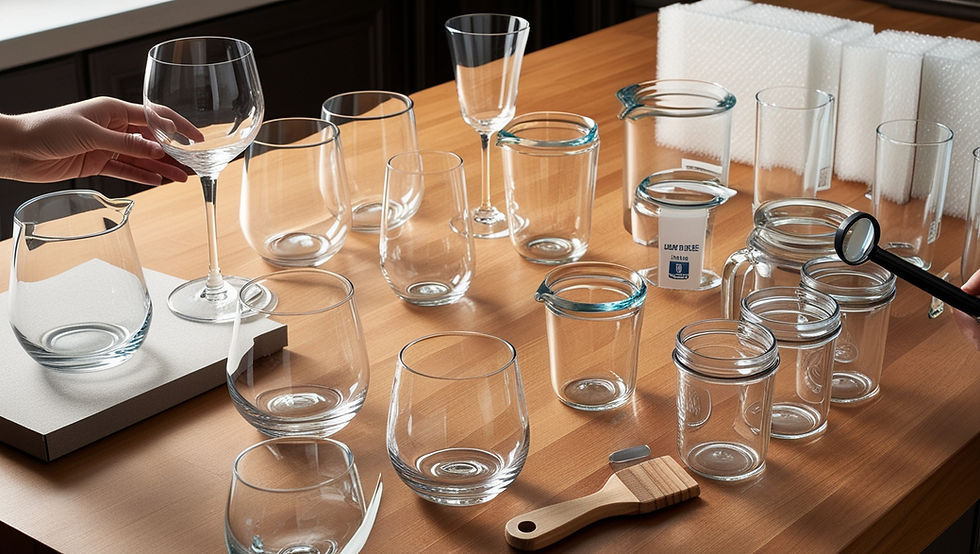How to Spot Quality Kitchen Glassware When Buying Wholesale
- bumtresdglassware
- Aug 6, 2025
- 4 min read

Buying kitchen glassware in bulk can be a game-changer for restaurants, catering businesses, homeware retailers, or even event organizers. But let’s be honest—buying wholesale kitchen glassware isn’t just about finding the cheapest deal. It’s about making sure you're investing in durable, elegant, and high-quality glassware that represents your brand and stands up to everyday use.
So, how can you confidently tell the difference between poor-quality products and those worth your money?
Here’s your no-fluff guide to spotting top-quality kitchen glassware when buying wholesale.
1. Understand the Types of Glass Used
First things first: not all glass is created equal.
High-quality kitchen glassware is usually made from one of the following:
Soda-lime glass: Most common, affordable, and suitable for everyday use.
Borosilicate glass: Heat-resistant and ideal for glass cookware or microwave-safe items.
Crystal or lead-free crystal: Known for its clarity and brilliance, often used in high-end drinkware.
💡 Tip: Always ask your wholesale kitchen glassware supplier what type of glass is used in their products. If they can't tell you, that's a red flag.
2. Check for Clarity and Transparency
Good quality glassware should be clear, smooth, and free of bubbles or tinting (unless designed that way). Any haze, cloudiness, or air bubbles often signals inferior craftsmanship or manufacturing defects.
Hold the glass up to the light. If it sparkles, you're on the right track. If it looks dull or uneven, think twice.
3. Inspect the Weight and Balance
While weight is often subjective (some prefer lighter glasses, others heavier), consistency matters.
Here’s what to check:
Do the glasses feel balanced in your hand?
Are they evenly weighted at the base?
Is the rim thickness consistent across the batch?
A wobbly wine glass or uneven drinking tumbler screams poor manufacturing.
4. Feel the Finish
Run your fingers over the rim and edges. High-quality glassware will have smooth, polished edges, especially on the lip and base. Jagged or sharp edges mean poor quality control and potential safety hazards.
Also, check the stem (for stemware) — it should be firmly attached, with no visible seams or glue spots.
5. Look for Durability Features
When buying wholesale, you're not just buying for show—you need glassware that withstands repeated use, dishwashing, and handling.
Ask your supplier if the glassware is:
Dishwasher-safe
Thermal shock-resistant
Tempered or toughened for strength
Resistant to breakage or chipping
You’re buying in bulk, so the last thing you want is to replace half your inventory after a few uses.
6. Request Samples Before Bulk Purchase
This step is often overlooked but absolutely essential.
Even if the supplier looks reliable, request a sample batch before placing a large order. Test the samples for:
Heat resistance
Scratch resistance
Clarity after washing
Consistency in shape and size
Real-world testing helps eliminate any guesswork and gives you peace of mind.
7. Inquire About Manufacturing Standards
Always ask your supplier about their manufacturing processes. Reputable manufacturers follow international safety and quality standards such as:
ISO certifications
SGS or FDA approval for food-safe products
BPA-free or lead-free assurances
These certifications signal that you’re working with a responsible and reliable supplier.
8. Review Customer Testimonials and B2B References
In the B2B world, reputation is everything. Before committing to a bulk order:
Check online reviews or trade platform ratings
Ask the supplier for past client references
Look for any complaints or issues with delivery, breakage, or quality
A supplier with a long history of reliable service and happy clients is worth holding on to.
9. Compare Pricing—But Don’t Just Go for the Cheapest
Sure, price matters—but cheap can be expensive in the long run.
You may save a few bucks upfront, but if your customers complain about chipping or you constantly need replacements, you’ll lose money and reputation.
Instead, compare:
Unit price vs. lifespan
Material used vs. quality assurance
Bulk discount vs. added features (e.g., custom branding)
Strike a balance between affordability and quality.
10. Ask About Packaging and Shipping Protection
When you’re ordering kitchen glassware wholesale, breakage during transit is a real risk. Make sure the supplier:
Uses shock-resistant packaging
Has clear breakage replacement policies
Offers insurance or guarantees on large orders
A reliable kitchen glassware wholesaler will go the extra mile to ensure your products arrive intact.
11. Don’t Ignore the Aesthetics
While functionality is key, don’t forget design.
Customers and end-users are drawn to glassware that is not only durable but also visually appealing. Look for collections that blend well with modern kitchen trends or allow you to customize branding, logos, or colors for your brand.
Great design = better resale potential or customer satisfaction.
Conclusion: Quality Pays Off in the Long Run
Buying wholesale kitchen glassware isn’t something to rush. From checking the clarity, weight, and durability to asking the right questions about manufacturing and standards, every step ensures you're making a smart investment.
In the end, quality glassware lasts longer, performs better, and builds trust with your customers—whether they’re sipping wine in a bistro or enjoying juice at home.
So take your time, do your homework, and partner with a supplier who values quality as much as you do.



Comments